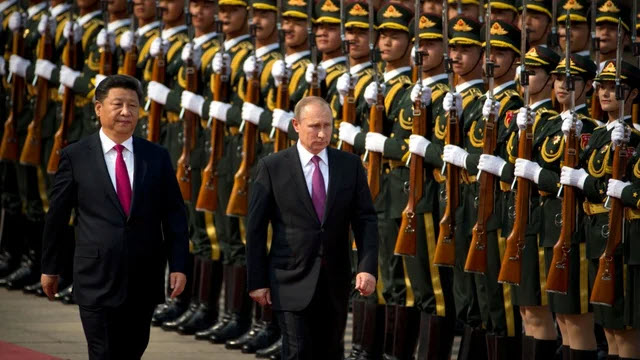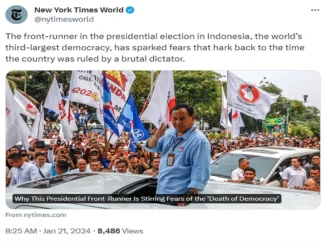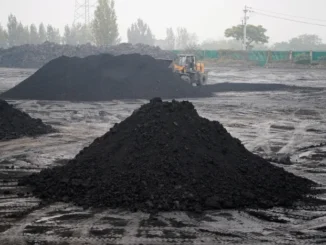
The invasion of Ukraine can now begin.
China, from all appearances, has given Vladimir Putin the one thing he needs to defy the United States and the international community. The Russian autocrat looks like he has secured an economic lifeline from Beijing.
“What everybody forgets here is Russia needs to be able to sell that gas and sell that oil,” President Joe Biden said Monday during his press conference with German Chancellor Olaf Scholz. “Russia relies — a significant part of Russia’s budget — it’s the only thing they really have to export. And if, in fact, it’s cut off, then they’re going to be hurt very badly.
Biden was talking about Nord Stream 2, the pipeline slated to carry Russian gas to Europe through Germany. If Russia invades Ukraine, Washington does not want the pipeline to start operation.
The Russian strongman was one step ahead of the American president, however. Putin, in Beijing on Feb. 4 for the opening ceremony of the Winter Olympics, announced $117.5 billion of new oil and gas deals with China. “Our oilmen have prepared very good new solutions on hydrocarbon supplies to the People’s Republic of China,” he declared.
The new deals will not help Russia with the current crisis — gas will not start flowing over a new pipeline to China for at least two years — but Beijing can increase purchases of Russian hydrocarbons under existing arrangements.
Nonetheless, Beijing’s message to the United States and others was unmistakable. “The Russian and Chinese governments have made clear to the world that their joint confrontation with the United States will include a strategy of taking care of each other’s needs,” Jonathan Ward, the author of “China’s Vision of Victory,” told me after Putin’s announcement of the oil and gas deals. “China, through its economic courtship of Iran, has already demonstrated its willingness to work with nations that have been sanctioned by the West.”
Beijing’s support suggests it is thinking of taking advantage of the conflict in Eastern Europe to engage in mischief of its own. As Ward says, “the Russia-China relationship has been blossoming on a wide range of fronts — military, energy, infrastructure, even authoritarian ideology — and we should expect that Beijing will want to throw a lifeline to its partners in the Kremlin, in part because distracting America in Eastern Europe may keep us off balance in Asia.”
The announcement of the new Russia-China oil and gas arrangements makes Washington’s warnings seem hollow, or at least behind-the-times. “We have — and when I say we I mean collectively, the United States and our allies and partners — we have an array of tools that we can deploy if we see foreign companies, including those in China, doing their best to backfill U.S. export control actions, to evade them, to get around them,” said State Department spokesperson Ned Price last week during his regular press briefing.
China’s commitment to buy more Russian oil and gas certainly qualifies as “backfilling,” especially because Biden has identified hydrocarbon sales as the core of Putin’s economy, which means they are essential to Putin’s war machine. The concern is not theoretical: Reuters reports that Russia might use a field already under U.S. sanctions to supply gas to China pursuant to the just-announced deals.
After Putin’s more than two-and-a-half-hour meeting on Friday with Xi Jinping, Moscow and Beijing issued a joint statement announcing “that the new inter-State relations between China and Russia are superior to political and military alliances of the Cold War era.” “Friendship between the two States,” the statement declared, “has no limits, there are no ‘forbidden’ areas of cooperation.”
Price, the State Department spox, has an answer. “No partnership,” he said last week, “can account for the massive economic toll that we’ve talked about given the financial tools that are available to us, the sanctions tools that are available to us, and the export control actions, among others, that we’re in a position to take.”
Yes, the United States can cripple Russia, but only if the U.S. prevents Chinese backfilling. U.S. policymakers, with the exception of those in the Trump years, have fervently believed that engaging the Chinese state would encourage it to become a “responsible stakeholder” in the international system.
American policy, therefore, has generally been extraordinarily indulgent, ignoring blatant Chinese sanctions-busting in the belief that Beijing would eventually come to see things Washington’s way. The result is that China has suffered almost no cost in openly — and continually — violating U.S. and U.N. sanctions on, for instance, the Islamic Republic of Iran and the Democratic People’s Republic of Korea.
Chinese policymakers know that Americans can impose what Ward calls “state-killer sanctions” on them, but they appear to believe the Biden administration would not dare.
Therefore, China appears ready to backfill and shows no fear in fueling Russian aggression. America, consequently, must now get ready for conflicts on both ends of the Eurasian landmass, facing two large and bold states that believe themselves to be a team — and beyond the reach of the United States.
Gordon G. Chang is the author of The Coming Collapse of China. Follow him on Twitter @GordonGChang.



